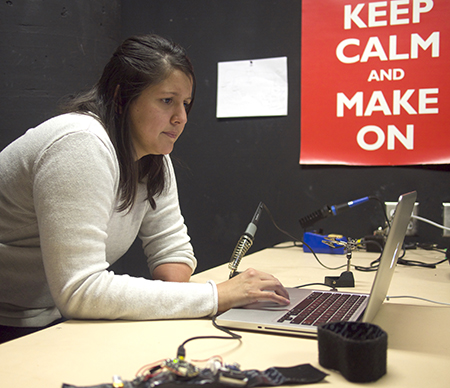March 19, 2015
Highlands graduate student Rianne Trujillo tests her cough monitor prototype for children with cystic fibrosis in media art’s software systems design classroom at the Natural History Museum in Albuquerque.
Las Vegas, N.M. – A Highlands University graduate student developed the first prototype for a wearable cough monitor for children with cystic fibrosis that will help physicians and parents better manage the children’s care.
Rianne Trujillo, a student in the media arts Master of Software-Driven System Design program, collaborated with the Little Devices Lab at the Massachusetts Institute of Technology to develop the automated cough monitor. The MIT lab explores the design, invention and policy for low cost do-it-yourself health technologies.
A persistent cough is one of the primary symptoms of cystic fibrosis, a life-threatening genetic disorder that causes mucus and other bodily secretions to thicken, plugging tubes and ducts. It becomes deadly when mucus blocks the airways to the lungs. An estimated 30,00o children and adults in the U.S. have cystic fibrosis.
“It’s important to monitor coughs because the data can be an indicator for treatment the children need like antibiotics. Better treatment can extend the life expectancy for children with cystic fibrosis,” Trujillo said.
The off-the-shelf electronic components for Trujillo’s prototype cost less than $45 per device.
“I used a low-cost, open-source microcontroller called Flora to program a wearable armband device to detect and track coughs in children with cystic fibrosis,” said Trujillo, a 26-year-old Las Vegas native. “I used a small microphone and an accelerometer – both are common sensors in cell phones – to detect sound and movement when the child coughs.”
“Rianne’s ability to marry the physical computing with the needs of the patient were outstanding,” said José Gómez-Márquez, a medical device designer who directs the Little Devices Lab. “The notion to include multiple sensors created a failsafe pathway for detection and patient monitoring.”
Gómez-Márquez contacted media arts professor Miriam Langer in September 2014 to see if she had a student who could develop the cough monitor prototype. Langer recommended Trujillo, who she advises and was teaching in a graduate-level physical computing class.
“When they came back three weeks later with a prototype that was not only functioning, but also generating smart data, I was blown away. Rianne has speed and elegance as a developer,” Gómez-Márquez said.
While the Little Devices Lab collaborates with universities like Harvard, Cornell, Dartmouth and Ohio State, Highlands is the first university in the western U.S. to work with Gómez-Márquez on joint projects.
“Highlands has a first-rate physical computing practice in media arts that will allow its students to search for meaningful projects that can be emulated around the world. I’m looking forward to further collaborations,” Gómez-Márquez said.
Langer said Trujillo is an exceptionally creative, thoughtful and methodical developer who brings a great deal of empathy to every project she develops – from creating the cough monitor prototype to designing a virtual reality application for Acadia National Park in Maine.
“Rapid prototyping like Rianne accomplished requires a very creative approach to problem solving. Technology for software and hardware is constantly changing, but problem-solving ability like hers remains the constant. Building this capability is fundamental to our program,” Langer said.
In April Trujillo will travel to Boston to present her prototype to Gómez-Márquez’ MIT class on patient- generated data devices.
“Our aim at the Little Devices Lab is to democratize medical technologies. Our class aims to take this one step further and generate meaningful patient data that can help us monitor high-risk patients. Devices like Rianne’s will inspire our students to know that we can get there one step at a time, one device at a time,” Gómez-Márquez said.
“It has been a great experience working with the Little Devices Lab at MIT,” Trujillo said.
“The MSSD program at Highlands gave me this wonderful opportunity and has really expanded my programming skill set as a developer of web and mobile applications, as well as hardware.”
She will complete her master’s degree in May. In 2011, Trujillo earned her BFA in media arts from Highlands with a concentration in interactivity and multimedia.

